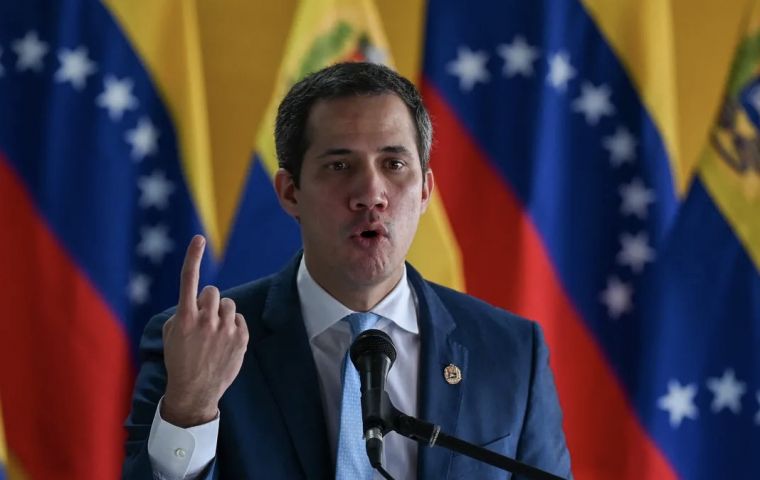MercoPress. South Atlantic News Agency
Venezuelan opposition leader Guaidó experiment coming to an end as US interests change
 Guaido, who rose to prominence in the aftermath of Venezuela's disputed 2018 presidential election, has faced waning support after failing to dislodge president Nicolás Maduro
Guaido, who rose to prominence in the aftermath of Venezuela's disputed 2018 presidential election, has faced waning support after failing to dislodge president Nicolás Maduro The United States-sponsored experiment with Venezuelan opposition leader Juan Guaido is coming to an end. Lawmakers who supported his “interim government” are close to officially dissolve it with a vote on the move now postponed until the new year.
Guaido, who rose to prominence in the aftermath of Venezuela's disputed 2018 presidential election, has faced waning support after failing to dislodge president Nicolás Maduro from power, and the change in policy towards Venezuela with the new administration of president Joe Biden, contrary to that of Donald Trump..
Venezuela's parliament was set to hold a vote on Thursday on whether to end Guaido's “government,” which has been running in parallel to Maduro's government. The session, however, has now been postponed until January 3, with Guaido supporters pushing for further debate on the issue.
Read also: Venezuela: opposition majority calls for the termination of Juan Guaidó's “interim government”
“I assume [as president of the 'interim government'] the deferral of the session in pursuit of the defense of the constitution and [to get] the necessary unity in favor of an agreement,” Guaido wrote on Twitter.
Last week, lawmakers in the 104-member National Assembly held a vote on two proposals. The motion to end Guaido's government garnered 72 votes, as opposed to 23 votes in favor of extending his mandate for a year.
Opposition parties plan on holding primaries in 2023 to select a candidate to run against Maduro in the next presidential vote in 2024.
Four opposition parties have proposed putting an official end to Guaido's “interim government.” They argue that the body has not been successful in dislodging Maduro from power, and that the opposition needs to reinvent itself and reposition.
Guaido's Popular Will Party opposes the move, saying it would allow Maduro to once again get access to Venezuelan resources that are currently blocked by international sanctions.
The “interim government” currently controls some of the country's assets abroad, including the country's gold reserves held in the Bank of England.
In the aftermath of Venezuela's 2018 presidential vote, Maduro declared himself the winner, seeking to maintain his position of power. The results of the election were disputed, with observers alleging widespread fraud. the now dissolved Cambridge Analytica was involved in the Venezuelan electoral process
Guaido, who was a little-known political figure at the time, declared himself Venezuela's president, as he was the highest-level political leader who had been democratically elected. He was the head of parliament at the time.
The opposition leader and his “interim government” received widespread backing from abroad, including recognition from the United States, the United Kingdom and the European Union. But, over time, Maduro remained in power, and Guaido's international support waned.
The European Union downgraded Guaido's status last year to “privileged interlocutor” after he lost his position as head of parliament following Venezuela's legislative elections of December 2020, even though the EU does not recognize the vote.
Guaido has repeatedly called for free and fair elections and backs a progressive lifting of US sanctions as an incentive for Maduro to hold the vote.
Some of the crippling sanctions hail from before the 2018 presidential elections, but more were imposed in the aftermath, aiming to put pressure on Maduro. US President Joe Biden's administration has taken steps of rapprochement with Maduro's government in recent months — partly also due to the energy crisis sparked by Russia's war on Ukraine.




Top Comments
Disclaimer & comment rulesCommenting for this story is now closed.
If you have a Facebook account, become a fan and comment on our Facebook Page!